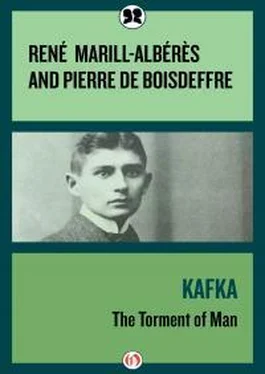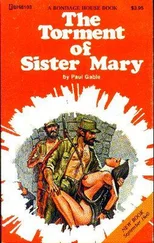Many of Kafka’s works were unfinished and were published after his death. Although they are incomplete, sometimes fragmentary, or even distorted (if Max Brod modified the arrangement of the chapters in The Trial ), all of them convey a striking impression of unity. This sense of unity appears for the first time in “The Judgment” and “The Stoker,” at the end of his youthful period.
Written in one night, “The Judgment” is an admirably coherent text whose themes become oppressive and precise. Kafka himself admits that Freud, Wassermann, and Werfel’s The Giantess “were thrashing around in my head” while he was writing the story.
This fascinating tale is truly a psychological drama, but it is one that could be felt by Kafka, who had been pushed to the brink of exasperation and even of madness. Georg Bendemann, a young businessman, is troubled by one thought: he has failed to notify a friend living in Russia of his engagement. He talks with his father about the problem, and the old man’s behavior is cruel and absurd. The Father pretends at first not to remember Georg’s Russian friend, then in a nervous outburst reveals that for years he himself has been carrying on a secret correspondence with this distant friend. He has never ceased to complain to the Russian friend about the turpitude of his son, who is abandoning his old parents for marriage. “Hypocrite!” Georg shouts out in spite of himself, then, after it is too late, realizes his mistake and bites his tongue.
Nothing is illogical in this violently offensive psychological drama. We need only imagine that the neurotic father is on the verge of a breakdown, and the apparent psychological absurdity of the characters is only the absurdity of neurotics. Still, Kafka develops the situation in a “dark” style: maddened by the paternal curse Georg Bendemann flees, runs though the streets, reaches a bridge, and leaps over the parapet.
He clung for still an instant, his grip weakening, watched between the bars for the passage of a bus which might drown out the sound of his fall, cried out faintly, “Dear parents, after all I have always loved you,” and fell into the void.
An unending steam of traffic was just going over the bridge. 13
Here his concern for art is revealed: the last lines would serve for what is technically called a “fade-out” scene in a filmed melodrama. Even under the excitement of a cruel psychological tale, Kafka still “composes.” Everything is contained in the virulent drama of his narrative, motivated from start to finish by a feeling of agonizing guilt—pathological guilt, one might say—which grows in intensity until it culminates in madness: Georg’s guilt with respect to his distant friend, then the father’s guilt with respect to his son, and finally the son’s guilt with respect to his father. Anguish grows in intensity until it leads to suicide. If everything is exasperating, unexpected, shocking, everything is nevertheless coherent, in the atrocious logic of cruelty.
In contrast to this cruelty, goodness—rare in the writings of Kafka—predominates in “The Stoker.” Here too, in a narrative of doubtful verisimilitude, unity of feeling manifests itself, almost to the point of tenderness.
How naive young Karl Rossmann is! Seduced by a maid, he becomes a father and is dispatched to America by parents eager to avoid complications. When the ship arrives at the Statue of Liberty, Karl sets his trunk on the deck and runs down into the hold of the ship to look for his umbrella. He quickly forgets his first intention, for he meets a stout, uncouth “stoker” who has just been dismissed by the Chief Engineer. Forgetting his umbrella and trunk, Karl sides with this man and takes him to the Captain. He pleads for his new friend, but the Stoker is boorish and loses his case because he presents it with sincerity and vehemence (incidentally, is this not very good “psychology”?). Karl then discovers in the Captain’s office his Uncle Jacob, an American senator and a capitalist, who takes him away by force, depriving him of the Stoker’s friendship.
Everything is unexpected—still and always—in this fast-moving narrative. Rather comical too: the boy who had been deported from Europe with his meager baggage is welcomed to New York by a millionaire uncle. But the pathetic element of the narrative resides in the attachment which this young boy, beset by a thousand other cares, manifests for no discernible reason for the clumsy bunker-hand whom he has met by chance. “And Karl began to cry as he kissed the Stoker’s hand; he took that cracked, almost lifeless hand, pressing it to his cheek like a treasure which he would soon have to give up. But his uncle, the Senator, was already at his side …” Speaking of this text, Kafka told Janouch, “Love is not in the story but in the very nature of what is told.” 14
With its surprising succession of events, its harshness and tenderness, this text, a forerunner to Camus’ The Stranger , is at once pessimistic and optimistic. Six other chapters complemented the novel, but without completing it. Furthermore, nothing ever happened after 1911 to dispel the impression that Kafka intended to blend into the absurdity of events an element of joy and goodness.
The remaining chapters of Amerika show Karl in the home of his uncle, the Senator, exploited by a worldly society ready to make a fool of this charming boy cast by Europe on the shores of the New World, then deceived again by two poor drifters who travel in vain through New York without finding work—though their laziness and instability make them unfit for work. Karl nevertheless blames no one: he loves everyone he meets just as, by contrast, all of Kafka’s other heroes, more numerous, are afraid of everyone they meet. It matters little that Karl humbly carves out for himself a place in the Stifling, hierarchical organization of a large hotel (characteristic of the organs of Administration that crowded Kafka’s universe), then falls into the hands of a crook and a madwoman before he finally discovers hope of a job and happiness by joining a gigantic circus which contrasts sharply, by virtue of its good organization and its attentiveness to its employees, with the absurd Administration of the hotel. It is indeed an optimistic theme—generosity compensates for absurdity and incoherence—which Kafka had begun to develop in the first chapter of Amerika . Though he later continued the novel in the same vein, all his other books refute such optimism. It is altogether fitting, however, that Kafka should have drafted, around 1911, a fanciful tale, almost in the style of Chesterton, free of obsession and pessimism.
By their coherence and consistent inspiration “The Judgment” and “The Stoker” introduced Kafka, around 1911 and 1912, to the art of persuasion: he learned to write and to force his myths on the reader. Thus the first period of his literary life concludes with the mastery of imagination and style. His inspiration, however, remained fluid. To the anguish of the single man was added the Kierkegaardian drama of a broken engagement.
Another spasm of despair was to penetrate and sear him, causing him to sublimate his torture and become a creator of myths and legends. The man within him had to suffer, hesitate, and doubt in order to bring about the metamorphosis which, thanks to his acquired mastery, would shift the Kafkan world from the disordered romantic tale toward the lucid and almost impersonal allegory.
NOTES
1. In the collection Préparatifs de noce à la campagne (Paris: Gallimard, 1957).
2. Diary , December 26, 1910.
3. Ibid ., November 3, 1911.
4. “Bachelor’s Misery,” quoted by Heinz Politzer, Franz Kafka, Parable and Paradox (Ithaca, New York: Cornell University Press, 1962), p. 30.
Читать дальше












